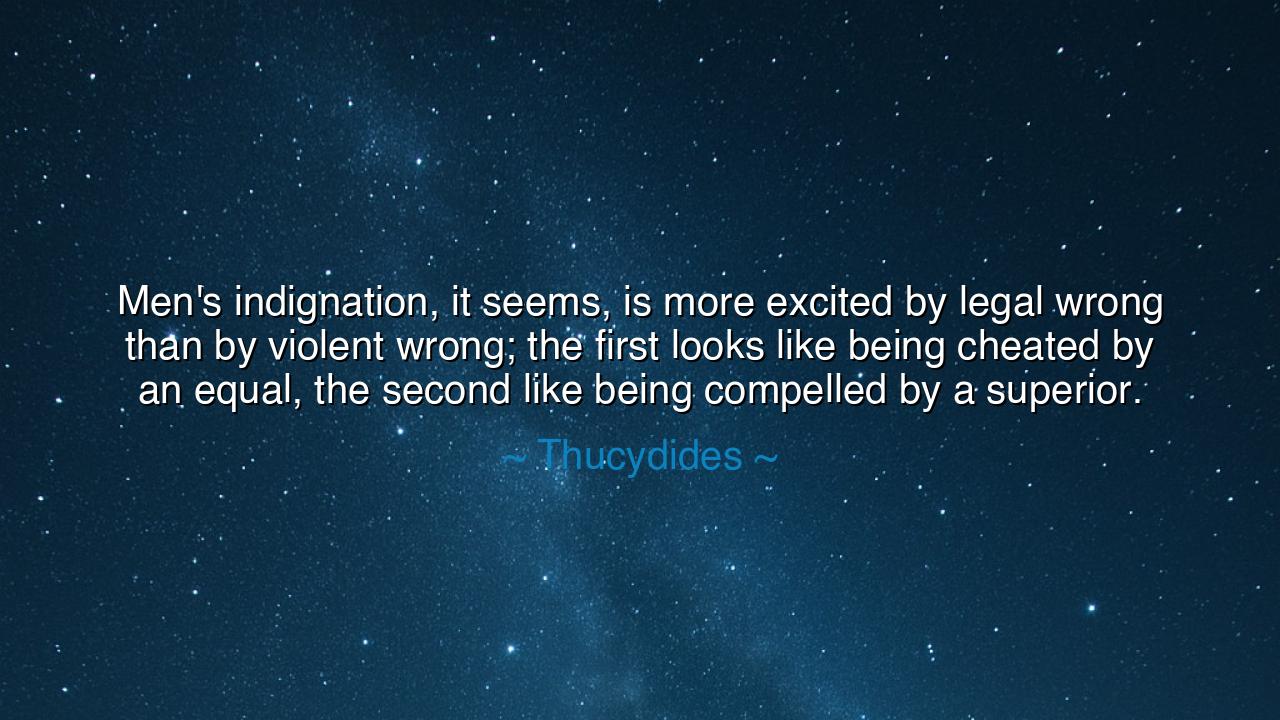
Men's indignation, it seems, is more excited by legal wrong than
Men's indignation, it seems, is more excited by legal wrong than by violent wrong; the first looks like being cheated by an equal, the second like being compelled by a superior.






Hear then, child of the present age, the wisdom of the ancients, as spoken by Thucydides, the grave historian of Athens, who gazed upon the fury of men and wrote what he saw without flattery or ornament: “Men’s indignation, it seems, is more excited by legal wrong than by violent wrong; the first looks like being cheated by an equal, the second like being compelled by a superior.” His words cut deep, for they pierce into the very marrow of human pride and the unyielding sense of dignity that dwells in the heart of man. Violence may strike the body, but fraud wounds the soul.
Consider this: when the spear of an enemy cleaves the shield, the soldier knows he faces a foe of might. His heart burns with wrath, yet his pride remains whole, for he contends with one who shows his strength openly, without disguise. But when the contract is twisted, when the scales are weighted falsely, when laws crafted by equals are bent for gain—then the man feels not merely harmed, but betrayed. It is as though one clothed in the same flesh has turned traitor, wielding not sword but cunning. Thus, legal wrong stirs a deeper indignation, for it cloaks itself in fairness, only to strike from the shadows.
So it was in the days of Rome, when the plebeians rose against the patricians, not for fear of battle, but for the endless injustices of debt and law. Bound by contracts they could never pay, cast into bondage not by raiders but by neighbors, the common folk cried out that they were treated worse by their fellow citizens than by foreign foes. For to be conquered by the Gaul or the Carthaginian was bitter indeed, but to be enslaved by one’s countryman under the guise of law was an agony beyond endurance. This, then, is the truth of Thucydides’ saying: a legal wrong is treachery by equals, while violent wrong is domination by the strong.
And yet, even in our own age, the lesson holds. Recall the story of the great Indian leader, Mahatma Gandhi, who endured violence from the might of empire. The blows of the police he bore in silence, for he knew them to be the weapons of a superior power. But when the British Raj clothed oppression in the garments of law—taxes upon salt, decrees that robbed men of their livelihood—then the indignation of millions was awakened. The salt march was no rebellion of blood, but a rebellion of justice, for the people felt not merely conquered, but cheated of their birthright by a power that pretended to be just.
Thus, my child, learn this: indignation is not only the cry of the weak against the strong, but the cry of the deceived against the deceiver. Better to face an enemy who declares himself openly with sword or spear, than a friend, neighbor, or ruler who cloaks injustice with the mask of legality. For the blow of violence may be endured with honor, but the sting of cheating by an equal gnaws at the heart like venom, corroding trust among men and sowing discord among kin.
What lesson, then, must you draw? Guard yourself not only against the strong who may compel you, but also against the equal who may betray you under the veil of fairness. Speak boldly when you see laws twisted to harm the innocent, for silence is the accomplice of deceit. Demand that justice be clear, simple, and without guile, lest men’s indignation boil over and consume the very fabric of the city.
And finally, in your own life, let your dealings be marked by honesty. Do not wrong your brother with trickery, even if the law gives you power to do so. For the law may shield your hand, but it cannot shield your soul. Better to lose wealth in plain contest with the mighty than to stain your honor by deceiving one who trusted you. Stand as one who chooses clarity over cunning, strength over slyness, and justice over advantage. In this way, you will leave behind not merely victories, but a legacy of trust, and the generations to come will bless your name.
Thus hear the wisdom of Thucydides, spoken across the centuries: men endure the might of the strong, but the fraud of the equal they will never forgive.






AAdministratorAdministrator
Welcome, honored guests. Please leave a comment, we will respond soon